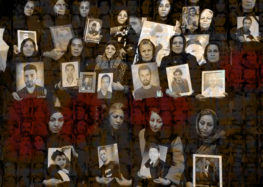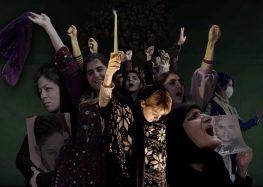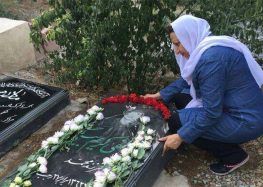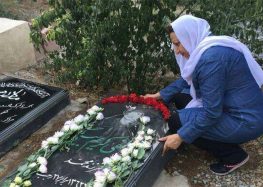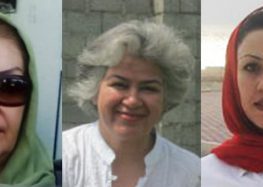Mother Who Founded Group Memorializing Massacred Political Prisoners of 1988 Summoned to Court After Flight Ban

“They are the ones who have to answer questions, not us.”
Mansoureh Behkish has been banned from leaving Iran and summoned to court for her role in founding the “Mothers of Laleh Park,” also known as the “Mourning Mothers of Iran,” a group formed by mothers whose children were killed in the Islamic Republic’s massacre of political prisoners in the summer of 1988.
“On September 16 [2016] I was going to leave the country to visit my daughter when I was stopped at the Imam [Khomeini International] Airport [in Tehran] and banned from leaving,” said Behkish in an interview with the International Campaign for Human Rights in Iran. “They confiscated my passport and gave me a piece of paper that said I should appear at the Shahid Moghaddas Court in Evin Prison. I decided to cancel my trip, but [the authorities] still won’t leave me alone and have sent me a summons.”
“The summons says I should make an appearance to answer questions about certain allegations, but I don’t know what they are referring to. Do they want to apologize and give me back my passport? Maybe they want to continue to harass me,” she said. “Instead of consoling us [for the 1988 massacre], they put us under pressure and threaten us. Of course, this is the Islamic Republic. We don’t expect anything other than intimidation and torture.”
“I’m going through treatment for problems in my right eye after a cataract operation, but I will probably go to Evin on Saturday morning [October 22] to find out why they summoned me,” she added.
The Islamic Republic of Iran, in its 37-year history, has executed more than 15,000 political prisoners. In 1988, Ayatollah Ruhollah Khomeini, the country’s supreme leader at the time, ordered the mass execution of political prisoners.
According to Amnesty International, at least 4,482 young men and women disappeared during a two-month period in 1988. Many of the executed prisoners had already served their sentences. The bodies of the victims were buried in unmarked graves and their families were never informed of their whereabouts. In 2012, a people’s tribunal, presided over by respected international judges, investigated these crimes and found Iran’s leaders guilty of crimes against humanity.
Six members of Behkish’s family were also executed in the 1980s for political reasons.
Behkish also told the Campaign about her frequent run-ins with security agents: “Anyone who opposes their views is treated as an enemy. They know I haven’t been a member of any political group, but I always have and always will seek justice. I consider it my right. I will expose them. I’ve told them that if they continue bothering and intimidating me, I will write and shout about it to everyone in the world.
“We are really owed justice. They have committed so many atrocities. They have killed the best young people of this country under all kinds of torture without explaining how and why. I will stand up and shout about it. I believe it’s my right. They are the ones who have to answer questions, not us. They owe us answers. We don’t owe them anything,” she said.
On December 25, 2011, Branch 15 of the Revolutionary Court sentenced Behkish to four and a half years in prison for “assembly and collusion against national security through the formation of the Mourning Mothers organization.” Upon appeal the sentence was reduced to six months in prison plus a suspended three and a half year prison term.
“What is Mansoureh’s crime, other than reminding and exposing and seeking justice for political crimes committed in our society?” wrote political activist Parastou Forouhar on her Facebook page on October 16. “Let’s support Mansoureh Behkish in her fight for justice and echo her voice of protest.”

